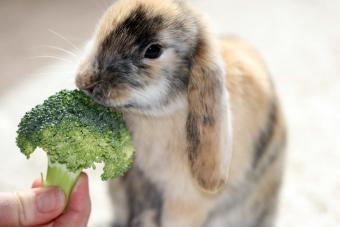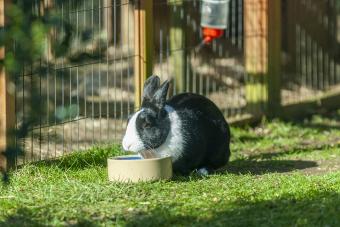
Once you know and understand how to properly care for your pet rabbit, you can expect your pet to live a long and happy life. Rabbits can be wonderful companions if you are prepared to give them the time and attention necessary to thrive.
What to Feed Pet Rabbits
Rabbits are herbivores, which means they eat plant-based foods. A good rabbit diet includes water, hay, fresh vegetables and fruit, and specially made rabbit food pellets. High-quality hay, including Timothy, orchard, or brome, should make up the bulk of your rabbit's diet. Rabbits must have unlimited access to hay to remain healthy.
Feed your young rabbits pellets, and then introduce and gradually increase the number of fresh vegetables and hay you give them. The pellets developed specifically for rabbits are vitamin-rich and high in fiber. Fresh water should be available at all times. Make sure the vegetables, fruit, hay, and any outdoor plants your rabbit may graze on are pesticide-free.
Don't give your rabbit bread, crackers, pretzels, cookies, chips, or cereals that are high in carbohydrates and salt as these could result in illness. Commercially available rabbit treats, including yogurt chips, are often rich in fat and sugar, even though they are labeled rabbit-friendly, and are not recommended.
Feeding Your Rabbit Vegetables
Some vegetables can be fed daily and others should be fed every few days. You should feed your rabbit a mix of vegetables to provide variety. Some veggies have more nutrients than others or contain different amounts of certain nutrients. Variety ensures there aren't any gaps in their nutritional needs. Some vegetables you can feed your rabbit daily include alfalfa sprouts, arugula, bok choy, butter lettuce, celery, green bell peppers, romaine lettuce, and fennel.
Vegetables that should be fed every few days or more include broccoli stems, carrots, chard, clover, collard greens, kale, and spinach.

Feeding Your Rabbit Fruit
Rabbits have sensitive stomachs so each type of fruit should be gradually added to your rabbit's diet to reduce the chance of diarrhea. Fruits that are safe to feed occasionally, and not fed regularly, include apples, bananas, cranberries, grapes, oranges, papayas, peaches, pears, strawberries, grapes, and watermelon.
How Much to Feed Your Adult Rabbit
Rabbits should have access to hay always as it should be around 80 to 90% of their daily diet. Their daily portion of rabbit pellets should be about 1/4 cup. Smaller dwarf rabbits under 6 pounds should receive half that amount per day. While you would think larger breeds of rabbits will need a larger serving of pellets per day, they, in fact, should eat about the same amount as a regular-sized rabbit. Rabbits should receive fresh fruits and vegetables in the following amounts:
- Feed daily a maximum of two cups of mixed vegetables per average-sized rabbit and one cup for dwarf bunnies
- Feed fruit once or twice a week based on a ratio of one to two tablespoons per five pounds of rabbit body weight.
Feeding Baby Rabbits
Rabbits weaned from their moms at the age of eight weeks should be freed fed rabbit pellets and alfalfa hay until they are three months old. At this point, you can begin slowly adding vegetables. Only add one type of vegetable in and monitor the bunnies for any signs of diarrhea. Once your rabbit is seven months old, he can start to have unlimited access to timothy hay and you can wean them off the alfalfa and reduce their pellets to a 1/2 cup per day for every six pounds of their weight. You can also start introducing them to fruit at a rate of one or two ounces a day, and as with vegetables, start with one type of fruit at a time. Once they hit one year of age, you can move them to their regular adult diet.
Pet Rabbit Housing
If your rabbit will be an outdoor pet, purchase or make a rabbit hutch. If you choose to house train your rabbit, buy a small floor cage that is made for indoor purposes. This type of cage also acts as a litter box for the rabbit. The cage is over the litter box for easy cleaning. Once the rabbit becomes used to their cage, you can leave the door open and she will leave the cage and come back to eat, sleep and defecate once they are house trained.
General Characteristics
Rabbits have always been popular as outdoor pets kept in cages, but they are now popular as house-trained indoor pets. Learning about their behavior, lifespan, and health has always been important, but understanding how they act in a domesticated, indoor lifestyle will make the bond you share stronger resulting in a happier, healthier rabbit.
Behavior
Domesticated rabbits are similar to cats in that they are generally clean and can be house-trained to defecate in a litter box. They are also like puppies because they like to chew and nibble on anything near the ground such as electrical cords, toys, furniture, and draperies. Rabbits will mark their territory with urine if they are not litter box trained. Both house rabbits and outdoor rabbits need early and continued socialization or they will become skittish, moody, difficult to hold, and may bite.
Spayed and neutered rabbits make better pets because they are less aggressive, become more docile, and are less territorial. Children should be supervised around a pet rabbit. Rabbits can have a heart attack if they become extremely frightened.
Carefully support the front legs of a rabbit with one hand or arm while supporting the back legs with the other hand or arm when handling a rabbit. Improper handling can hurt the rabbit and cause significant stress.
Health
Rabbit teeth continue to grow all through their lives, so they need to chew to keep their teeth healthy and at the proper length. Provide your pet with chewing blocks purchased at your local pet supply so you can be sure the wood is free from any chemical treatments. You'll also want to look at your pet's teeth periodically to check for malocclusions. A malocclusion occurs when teeth overgrow and no longer fit together as they should. This condition can ultimately result in a rabbit being unable to eat, so it's best to check periodically and consult your vet if something doesn't look right.
Rabbits are also prone to other health conditions including:
- Gastrointestinal stasis is a condition where the rabbit's digestive system basically stops working. It can be deadly if not caught early. Signs include lack of appetite, smaller than typical excrement or none at all, lethargic behavior, and a "hunched" body position that suggests the rabbit is not feeling well.
- Heatstroke is a common problem with rabbits that are either always kept outside, especially without a hiding spot, or just brought outside to play.
- Heart attacks are also very common with rabbits, and any undue stress can trigger a heart attack. It's important to not do anything to make your bunny anxious or frightened.
- Uterine and mammary cancer is common in female rabbits. Sterilizing rabbits can reduce their cancer risk.
- Rabbits are also susceptible to eye conditions, particularly conjunctivitis, which can cause serious problems for a rabbit's vision if not treated.
Lifespan
The average lifespan of a pet rabbit is between eight and 12 years, but this can vary greatly depending on the breed. The lifespan of smaller rabbits is longer than that of larger ones. Rabbits kept indoors have a higher average lifespan than those kept outdoors.
Join a Pet Rabbit Group
Serious pet rabbit owners should check into joining an organization such as the House Rabbit Society to get support and knowledge from other pet rabbit owners. These types of societies help rescue domesticated rabbits from homes and shelters when people do not want them anymore. These groups also help educate future pet owners on the proper care and feeding of pet rabbits.
It Takes a Real Commitment
The care and feeding of pet rabbits is a fairly simple yet rewarding job. However, it does take dedication to keep up with that care week after week and, ultimately, year after year. With the proper care and feeding of pet rabbits, you can expect your rabbit to become sociable, docile, and even huggable. They may even sit on your lap just like a lap dog. Just be sure you can make the commitment to provide them with everything they need, and they'll reward you with warm and fuzzy companionship.







